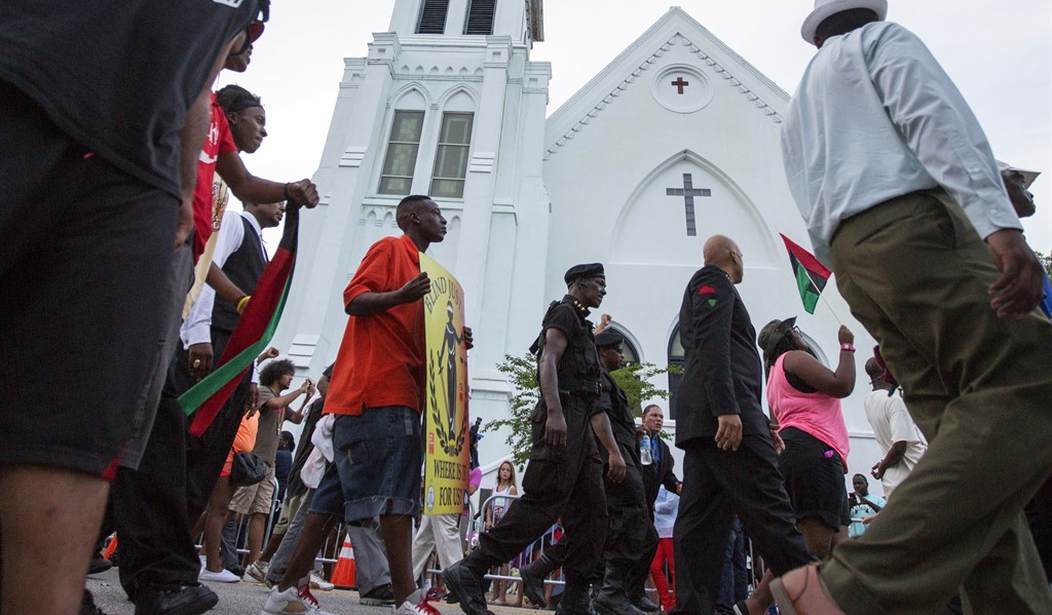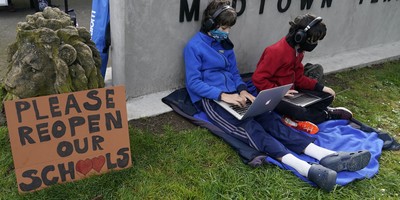What do we talk about when we talk about race in America?
We begin as if we're talking about all of us, together, as if we're earnest, as if we care about solutions. But it ends up being about what it's always been about:
Ourselves.
We talk of what we want and how we want it. We demand that others see things the way we see them. If they don't, we shame them in the hopes of correcting their vision and beating an enemy into the ground.
That's how we hold our conversations about race in America.
We've had them before and we're having one now, mourning the nine poor souls, African-Americans killed in a historic black South Carolina church by a racist white madman.
If you scanned the news about the horror in the Emanuel African Methodist Episcopal Church in Charleston, you've read about sorrow.
You've read about the victims' families, Christians, turning the other cheek to forgive the suspect.
But I know you've paid attention, so you've seen something else: The language of factions, of tribes, the use of symbols, code words and assumptions to fix political rivals like insects pinned to a board.
Some Southern whites couldn't help but cling to the Stars and Bars, the battle flag of the Confederacy flying on the grounds of the South Carolina Capitol. Many said it wasn't about race, but tradition. They're wrong. It is about race.
"One hundred and 50 years after the end of the Civil War, the time has come," said South Carolina Gov. Nikki Haley, a Republican, in announcing the flag should be removed.
She's correct.
Some African-Americans and most of the Political Left didn't want to consider a lone racist madman pulling a trigger in that church.
Recommended
They saw what they wanted to see, the racist's connection to other haters on the Internet as evidence of some larger, continuing, organized oppression.
Naturally, the government response historically has been, perversely, a continuation of race-based preferences, or if you prefer, affirmative action, in contracting, hiring and promotion.
Blacks don't see race-based preferences as racism. They see it as fair for making up for what was done in the past.
Yet that's not how many whites see it, particularly those whites who weren't here in America's past. But to speak up -- at least in the corporate, academic and political worlds -- means you could easily be denounced as a racist.
Many bite their lips and seethe rather than commit career suicide.
So what conversations about race in America do we have, really? We talk past each other.
Predictably, liberals relied on their old standby, gun control, securely using the First Amendment to obliterate the Second Amendment.
And with so many taking advantage of the tragedy to push their political agendas, Hillary Clinton wanted to play too.
She used the killings to bludgeon Donald Trump, the cartoon candidate and self-styled populist who is loudly opposed to illegal Mexican immigration.
"The people who do this kind of dastardly, horrible act are a very small percentage," Clinton said about the South Carolina rampage. "But unfortunately the public discourse is sometimes hotter and more negative than it should be, which can, in my opinion, trigger people who (are) less than stable to do something like this.
"A recent entry into the Republican presidential campaign said some very inflammatory things about Mexicans. Everybody should stand up and say that's not acceptable," Clinton said.
I refuse to defend the ridiculous yet wealthy Mr. Trump, a carnival barker and sideshow geek who belongs on a reality show, not in the Oval Office.
But Mrs. Clinton's eagerness to bundle racial mass-killing with the immigration debate is despicable.
So don't tell me what difference, at this point, does it make. It makes a difference. And it proves my point.
Just how low will some go?
As low as it takes, even if it means reanimating the dead.
Oddly, President Barack Obama, who defeated Hillary for the Democratic nomination in 2008 with his campaign's expert use of the race card, was himself victimized by those even further to his left.
Cornel West, the black public intellectual, socialist and bit-part actor with small roles in the "Matrix" film trilogy, mocked the president's comments on the South Carolina tragedy.
In a recent interview about the killings, Obama said that racism continues. "And it's not just a matter of it not being polite to say n----- in public."
West, perhaps concerned he hasn't received enough attention lately, appeared on CNN. And there he unwittingly led a symposium on the absurd nature of identity politics. West said it was clear to him that Obama was our first "n-----ized black president."
West described such a N-word-ized person as a black who is "afraid and scared and intimidated when it comes to putting a spotlight on white supremacy and fighting against white supremacy."
It's clear that Obama, the first African-American president subject to cruel and boorish white racism, is not black enough for cruel and boorish black racists.
Take the blue pill, Professor West. Go back to sleep.
A conversation is about dialogue, an exchange of ideas. But too often when we talk about race in America, we forget about listening. We're about telling.
And that's not conversation. That's a speech.

























Join the conversation as a VIP Member